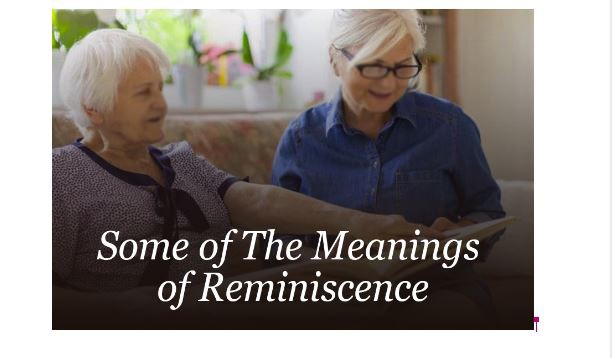Reminiscence is the unprecedented act of recalling memories, sharing stories about the past to youngsters, or thinking of anything else that holds significant importance in your life. Memorabilia, on the other hand, is described as items that are considered precious and are retained because they are connected to a significant event or person or because they have sentimental value. And what’s interesting is that both of these concepts accompany us in our later age when we have enough spare time to focus on the glorious memories of our lives and the things that hold utmost importance. And I must say that this is what brings pleasure and peace of mind to us when we are living voluntarily after retirement.
I feel compelled to mention Barbara Myerhoff at this point because I adore the way she tells stories and narrates them. She was an American anthropologist, filmmaker, and the mastermind behind the University of Southern California’s Center for Visual Anthropology. Throughout her career, Barbara Myerhoff made significant methodological contributions that later became accepted practices in social and cultural anthropology. Reflexivity, storytelling, and portraying anthropologists as social activists, commentators, and critics whose work is beyond academic boundaries are a few of these practices. She once wrote:
“A story told out loud to progeny or peers is, of course, more than a text. It is an event…its effect on the listener is profound, and the latter is more than a mere passive receiver or validation. The listener is changed…memory may offer the opportunity not merely to recall the past, but to relive it, in all its original freshness, unaltered by intervening changes and reflections.”
This is the immense power that reminiscence holds. Although I was neither progeny nor a peer to Margaret Parks, the protagonist in my recent book Thursdays With Margaret (available online on Amazon and Barnes & Noble), I had, over the course of the many hours I had spent with her, become a friend and a confidant. However, one of the many pleasures I received from my conversations with this charming 94-year-old lady was listening to her joyous recollections of a fascinating life and of times from a long-gone era. And the pleasure was mutual; she enjoyed the recollections as much as I did, even the sorrowful ones. This created an unconditional bond between the two of us that at least I am never going to forget.
For example, she told me about her poignant departure from her birthplace in Glasgow, Scotland, at the age of 11 after the death of both of her parents: “We came over to my sister Mary and my brother Jim…we came on one of the Cunard liners [Coronia]…we were booked like second class passengers, so we weren’t down in steerage…we were leaving, the band played, they played a song that…a song called “Home of Mine”…of course everybody was crying…can you imagine the people on the dock too…parents too, of course, we didn’t have parents….”
Similarly, she also discussed about her early married years to her beloved husband John: “…my husband used to drive me all around, ah, I lived in New York, and he lived out in Ocean Cliff, and he would come in on the weekends…and he followed all the big bands wherever they were playing… [she laughed] …he was, he played the trumpet, ah, he was good at it…he played in marching bands and for, ah, dance bands…little orchestra they had….”
These stories, like those of others Margaret’s age who I visited regularly, seemed to help her define herself over and beyond how she might otherwise be perceived by others if judged only through observation of her in her current circumstances. This also enabled her to recall her beautiful moments of life while bringing back the joy and happiness she endured all her lifetime.
However, what I have found from my interactions with the very old Margaret, and from having reached that status myself, is that there is a tendency for this age group to look at later generations as somehow having lost something by no longer accepting the worth of human beings simply as fellow human beings regardless of their ability to “contribute” to society or not. And memories of the “good old days” often recount things that could be either real or perceived, such as crime-free neighborhoods, a pre-welfare work ethic, respect for parents, a clean environment, mutual respect between employers and employees, and a generally more relaxed lifestyle. Younger generations might want to give their seniors more respect because these seniors have been around longer, experienced more of life, and maybe know a few things they don’t. This mutual relationship based on love and respect can not only help the elderly to live peacefully and with grace but can also allow them to enjoy their elderly life.

